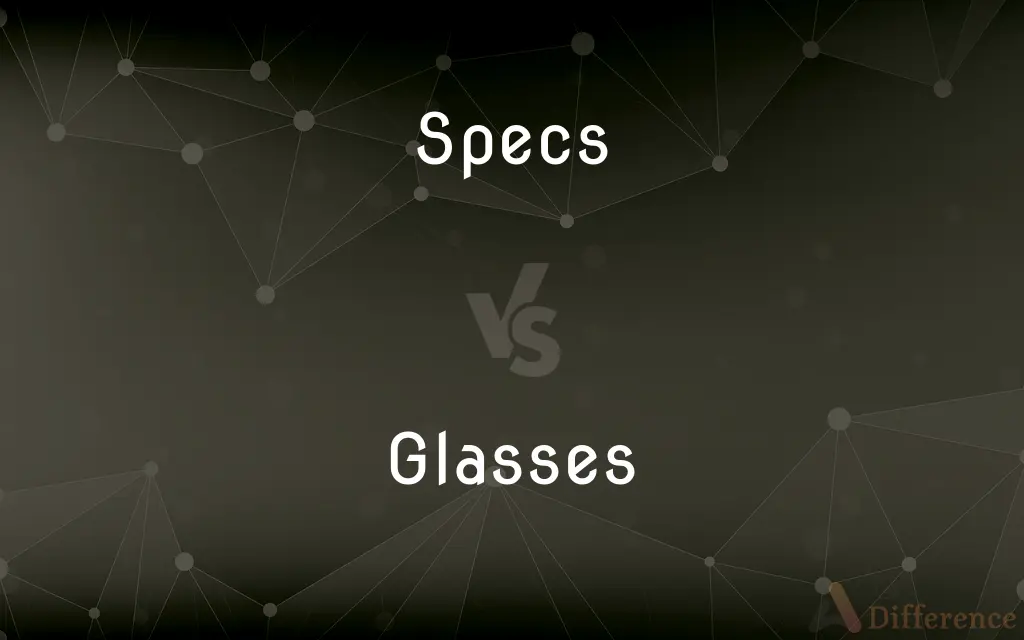Specs vs. Glasses — What's the Difference?
By Maham Liaqat & Fiza Rafique — Updated on April 3, 2024
Specs (spectacles) are eyewear designed for vision correction or protection, often with prescription lenses, while glasses refer broadly to any eyewear, including sunglasses or non-prescription lenses.

Difference Between Specs and Glasses
Table of Contents
ADVERTISEMENT
Key Differences
Specs, short for spectacles, specifically denote eyeglasses equipped with lenses to correct or assist visual impairments. These include single vision lenses for distance or reading, bifocals, and progressive lenses, catering to various vision correction needs. Specs are often personalized, with prescriptions tailored to an individual's visual acuity.
Glasses, in a broader sense, encompass all types of eyewear, including those designed for vision correction, sun protection, and fashion. This category includes prescription eyeglasses, but also extends to sunglasses, safety glasses, and decorative eyewear without corrective lenses. Glasses serve a wide range of purposes, from protecting eyes from UV rays to accessorizing.
While specs are primarily functional, aimed at improving sight or protecting eyes from strain (e.g., computer glasses), glasses can also be a fashion statement, with various styles, colors, and designs reflecting personal taste and trends. Sunglasses, for instance, might not always have prescription lenses but are essential for UV protection and style.
The choice between specs and glasses often depends on the intended use. For those with vision impairment, specs provide a necessary correction, while glasses could be chosen for protection or aesthetic reasons without necessarily correcting vision. Both, however, contribute significantly to eye health and personal style.
In terms of construction, specs require precise manufacturing to match prescription details, including lens power and frame fit. Glasses, especially non-prescription types, might not necessitate the same level of customization, allowing for a broader range of off-the-shelf options.
ADVERTISEMENT
Culturally, both specs and glasses have evolved beyond mere functionality. They are fashion accessories, symbols of intellect, or part of an individual’s identity. This evolution reflects broader changes in societal attitudes towards eyewear, from a necessary aid to a fashion essential.
Comparison Chart
Definition
Eyewear designed for vision correction
Broad category of eyewear, including specs
Primary Use
Correcting visual impairments
Vision correction, sun protection, fashion
Types
Single vision, bifocals, progressives
Prescription, sunglasses, safety glasses
Personalization
Prescription-based, tailored to individual
Ranges from personalized to off-the-shelf
Function
Primarily functional for eye health
Functional and/or fashionable
Construction
Precise to match vision needs
Variety in construction, not all require precision
Cultural Perception
Seen as essential for those with vision needs
Fashionable, versatile, can indicate style or status
Compare with Definitions
Specs
Eyewear with prescription lenses for vision correction.
She picked up her specs to read the fine print.
Glasses
Can be fashion accessories.
He wore red glasses to match his outfit.
Specs
Often include features like anti-glare.
His specs had a blue light filter for computer work.
Glasses
May or may not correct vision.
Those glasses are just for show; they don’t have prescription lenses.
Specs
Necessary for daily activities for many.
I can’t drive without my specs.
Glasses
Includes all forms of eyewear, prescription or not.
I bought a new pair of sunglasses for the beach.
Specs
Tailored eyeglasses for specific visual needs.
His new specs corrected his astigmatism perfectly.
Glasses
Protective eyewear falls in this category.
Always wear safety glasses in the lab.
Specs
Can be part of a professional look.
She chose a sleek frame for her specs to wear to the office.
Glasses
Variety of designs and purposes.
Her collection of vintage glasses was impressive.
Specs
A pair of spectacles.
Glasses
Glasses, also known as eyeglasses or spectacles, are vision eyewear, consisting of glass or hard plastic lenses mounted in a frame that holds them in front of a person's eyes, typically utilizing a bridge over the nose and hinged arms (known as temples or temple pieces) which rest over the ears. Glasses are typically used for vision correction, such as with reading glasses and glasses used for nearsightedness, however, without the specialized lenses, they are sometimes used for cosmetic purposes.
Specs
Abbreviation of spectacles
Glasses
A pair of lenses set in a frame resting on the nose and ears, used to correct or assist defective eyesight.
Specs
(colloquial) Specifications: spec
Glasses
Any of a large class of materials with highly variable mechanical and optical properties that solidify from the molten state without crystallization, are typically made by silicates fusing with boric oxide, aluminum oxide, or phosphorus pentoxide, are generally hard, brittle, and transparent or translucent, and are considered to be supercooled liquids rather than true solids.
Specs
(colloquial) spec
Glasses
A drinking vessel.
Specs
Optical instrument consisting of a pair of lenses for correcting defective vision
Glasses
A mirror.
Glasses
A barometer.
Glasses
A window or windowpane.
Glasses
The series of transparent plastic sheets that are secured vertically above the boards in many ice rinks.
Glasses
Glasses A pair of lenses mounted in a light frame, used to correct faulty vision or protect the eyes.
Glasses
Often glasses A binocular or field glass.
Glasses
A device, such as a monocle or spyglass, containing a lens or lenses and used as an aid to vision.
Glasses
The quantity contained by a drinking vessel; a glassful.
Glasses
Objects made of glass; glassware.
Glasses
Made or consisting of glass.
Glasses
Fitted with panes of glass; glazed.
Glasses
To enclose or encase with glass.
Glasses
To put into a glass container.
Glasses
To provide with glass or glass parts.
Glasses
To make glassy; glaze.
Glasses
To see reflected, as in a mirror.
Glasses
To reflect.
Glasses
To scan (a tract of land or forest, for example) with an optical instrument.
Glasses
To become glassy.
Glasses
To use an optical instrument, as in looking for game.
Glasses
Plural of glass
Glasses
Spectacles, frames bearing two lenses worn in front of the eyes.
Glasses
Field glasses; binoculars.
Glasses
Same as eyeglasses. See eyeglass{1}.
Glasses
Optical instrument consisting of a pair of lenses for correcting defective vision
Common Curiosities
How do I choose between specs and glasses?
Choose specs for vision correction and glasses for protection or style, depending on your needs.
What are specs used for?
For correcting visual impairments with prescription lenses.
Do I need a prescription for specs?
Yes, specs are typically made based on a specific prescription for vision correction.
Are sunglasses considered glasses or specs?
Sunglasses are a type of glasses and can be either non-prescription or prescription (specs).
Can glasses be worn just for style?
Yes, glasses can be a fashion statement without corrective lenses.
How long do specs last?
They can last several years, but prescriptions might change, necessitating new lenses.
Can glasses help with computer screen glare?
Yes, both specs and non-prescription glasses can have coatings to reduce glare.
Can specs be fashionable?
Absolutely, many specs are designed with fashion in mind, offering various styles and frames.
Is there a difference in cost between specs and glasses?
Prescription specs might be more expensive due to the customization, but designer glasses can also carry a high price tag for fashion reasons.
Are there glasses for people without vision problems?
Yes, non-prescription glasses can be worn for style or to protect from blue light and UV rays.
Share Your Discovery

Previous Comparison
Freckle vs. Blemish
Next Comparison
Keyboard vs. MonitorAuthor Spotlight
Written by
Maham LiaqatCo-written by
Fiza RafiqueFiza Rafique is a skilled content writer at AskDifference.com, where she meticulously refines and enhances written pieces. Drawing from her vast editorial expertise, Fiza ensures clarity, accuracy, and precision in every article. Passionate about language, she continually seeks to elevate the quality of content for readers worldwide.













































